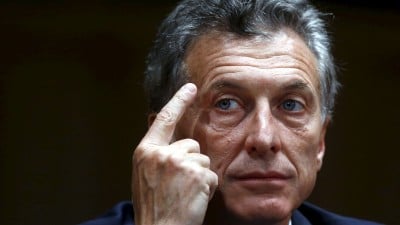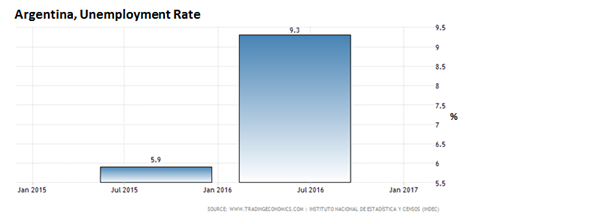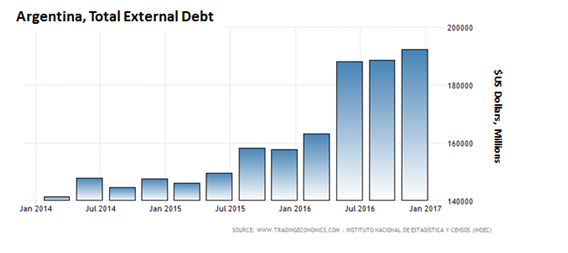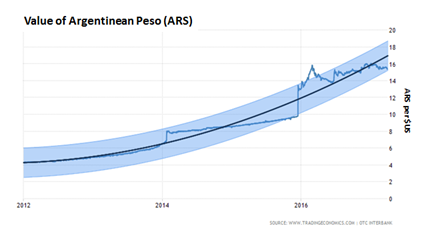President Mauricio Macri’s Neo-Liberal Orthodoxy: Keeping Argentina Firmly in America’s Backyard

Mauricio Macri became president of Argentina on November 22, 2015 when he defeated his opponent, Daniel Scioli, by capturing 51.4% of the vote in the second-round runoff election. He will make his first official visit to the White House on April 27th.
Macri was born into a very wealthy and elite family that owns one of Argentina’s most important corporate conglomerates, Sociedad Macri (Socma)[1], which dominates the country’s construction, automobile, postage and food industries. Socma benefited greatly from the military dictatorship that ruled the country from March 24, 1976 to December 10, 1983 on account of a close relationship between Francisco Macri (Mauricio’s father) and Jorge Rafael Videla[2] (1925-2013), who headed the junta for most of that period.Prior to the military coup that seized power, Socma owned only 7 enterprises; by the time the dictatorship had ended, this figure increased to 46 enterprises, many of which operated in Argentina’s the most important sectors.
Prior to becoming president of Argentina, Macri was made general manager of Socma in 1985 and president of Sevel Argentina in 1992; the latter is a branch of Socma that manufactured Chevrolet, Fiat and Peugeot automobiles for the Argentine market. From 1995 to 2007, he served as president of Boca Juniors, Argentina’s most popular soccer club. Subsequently, he was elected Mayor of Buenos Aires in 2007 and held the position until 2015. During that time, Argentina’s capital city accrued large debts and Marci was accused of mismanaging public funds by using them for his presidential election campaign in 2015.
During the election campaign, Macri clearly expressed his devotion to neo-liberal orthodoxy and extreme conservativism. Since being elected in December 2015, he followed through on his campaign rhetoric and implemented a variety of severe neo-liberal economic policies that run contrary to the Keynesian approach adhered to by the Néstor and Cristina Kirchner governments that preceded him.The austerity measures already implemented by the Macri administration include cuts to social spending, wage reductions, eliminating jobs in the public sector, devaluing the Argentinean peso (ARS), and privatizing the national airline, oil company and pension funds.
He also reduced subsidies on services, cancelled a series of electric and gas subsidies, lowered taxes for the wealthy, and eliminated tariffs and trade regulations.
To be more precise, some of the policies that Marci enacted shortly after being elected include the removal of exchange restrictions and the liberalization of the foreign exchange market, which produced a40% currency devaluation and a significant rise in inflation. Marci’s neo-liberal policies also resulted in a 50% rise in gas prices, and a combined increase of nearly 400% in the prices of electricity, water and public transportation. The National Institute of Statistics and Census of Argentina (Instituto Nacional de Estadística y Censos de Argentina (INDEC)) further reveals that Argentina’s inflation rate, which stood at about 14.3% in 2015, increased significantly in every month since Macri was elected, reaching 40.5% in April 2016. INDEC statistics demonstrate that inflation has been significantly higher during Macri’s rule relative to the periods when Néstor and Cristina Kirchner governed the country.
The large increases in general prices have led to a significant reduction in GDP per capita (adjusted by Purchasing Power Parity (PPP))since Macri was elected president of Argentina. According to INDEC, PPP-adjusted GDP per capita declined by approximately €2,452 from 2015 to 2016.Additionally, INDEC forecasts suggest that the prices of all goods will continue to rise while the purchasing power of Argentines will decline even further during the remainder of Macri’s presidential term, which expires in 2019.
These recenteconomic indicators demonstrate that president Macri’s policies and outcomes contradict his presidential campaign’s slogan of“zero poverty”. In 2017, the Catholic University of Argentina (UCA) published a study revealing that,since December 2015, president Macri’s neo-liberal policies haveresulted in the significant impoverishment of 1.5 million people. In just one year, the poverty rate in Argentina increased from 29% to 34.9%, which means more than one-third of Argentina’s population earns less than US$1.90 a day based onthe World Bank’s criteria.
The Gini index provides additional evidence to show that president Macri’s neo-liberal policies have been destroying much of the progress achieved in Argentina under the two successive Kirchner administrations. The Gini coefficient, which measures income inequality, indicates that the wealthiest 10% of the population earned 23.2 times more than the bottom 10% of Argentine society in 2016, a significant increase from the magnitude of 18.7 just one year earlier. Even Macri could not deny that his policies have increased the gap between the rich and poor as he was forced to admit that one in three Argentines lived in poverty in early 2017.
Since 2015, unemployment has also increased significantly in Argentina. In July 2015, the unemployment rate stood at 5.9%, the lowest on record in the country’s entire history. After only one year, Macri’s austerity policies caused the unemployment rate to reach 9.3%, with his mass firing of public servants likely playing a key role in this increase. It has since fallen to around 8%; however, INDEC forecasts the unemployment rate to reach 10.2% by the end of 2017.
According to INDEC statistics, President Macri’s neo-liberal policies have also dramatically increased Argentina’s external debt to US$192,461.67 million in the fourth quarter of 2016, the highest in the country’s history.If this trend continues, Argentina will likely have forgo its economic sovereignty to international financial institutions that will make fiscal and monetary policy decisions that favour Argentina’s creditors at the expense of its citizens.
INDEC studies have found that, as of February 2017[3], Argentina’s money supply has also reached a record level of ARS 2,049,239 million. This increase in money supply was a key factor in the rapid expansion of inflation that has taken hold in the country since the end of 2015.
The Argentine peso has been losing value since Macri’s election and is currently regarded as the world’s most volatile currency. In fact, Argentina’s peso experienced the most significant loss in value among all currencies in 2016, as its exchange rate depreciated 60% against the US dollar from ARS 9.6 per US dollar in November 2015 to ARS 15.4 per US dollar March 2016.
In just 15 months, Macri’s presidency has produced some of the most turbulent times in Argentina’s contemporary social, political and economic history. His regressive measures and devotion to neo-liberal policies have resulted in the elimination of subsidies, the reduction of social services, a devalued national currency, a rapid expansion of inflation, and mass layoffs of public employees in addition to other job cuts.This has generated a great deal of economic instability, increased poverty, and created a difficult situation for Argentina’s working class. Since Macri took office, various unions, small business owners and social organizations[4] have been protesting his policies and demanded better working conditions and wage increases to compensate for the purchasing power they have lost.
Macri’s neo-liberal orthodoxy has the potential to engender a social and economic crisis reminiscent of the one that Argentina endured in 2001-02, when the unemployment rate exceeded 20% and many people in the provinces experienced extreme poverty. In fact, Cristina Fernández de Kirchner warned that Macri’s election would jeopardize all of the progress that had been made since that low point in the country’s recent history. Contrary to Macri, both Néstor and Cristina Kirchner consistently supported the protection of social and civil rights, and the provision of social security programs. Furthermore, their adherence to Keynesian economic policies was able to return the economy to prosperity after the implementation of neo-liberal economic policies in the 1990s plunged the country into the most severe economic crisis in Argentina’s history in the early 2000s. The social and economic policies implemented by the successive Kirchner administrations generated higher growth rates, reduced the poverty rate by approximately 80%, and lowered the unemployment rate from an all-time high of 20% in 2002 to a record low of 5.9% in 2015.
Unlike president Macri, Néstor and Cristina Kirchner consistently defended Argentina’s independence from international financial organizations and imperialismin all its forms. Argentina’s diplomatic relationship with the U.S. became very tense during the successive Kirchner governments (2003-2015), who distanced themselves from American foreign policy and developed closer regional ties with the leftist governments of Bolivia (Evo Morales), Brazil (Lula da Silva and Dilma Rouseff), Ecuador (Rafael Correa), and Venezuela (Hugo Chávez and Nicolás Maduro).
President Macri’s loyalty to Washington was never in doubt.A recent WikiLeaks cable publicly disclosed that Macri’s close relationship with the United States government predates his election in 2015[5]. WikiLeaks published a conversation between candidate Macri and the former U.S. ambassador to Argentina that took place in January 2010, when he was still mayor of Buenos Aires. Over the course of their conversation, Macri criticised the U.S. government for being “too soft” on Argentina’s ruling government and requested U.S. assistance in promoting an anti-Kirchner campaign.
Currently, Argentina’s foreign policy is closely aligned with US interests in the region. For example, after being elected president, Macri accused the Maduro government of being undemocratic and publicly announced his intention to suspend Venezuela from MERCOSUR, South America’s sub-regional trading bloc. Although Macri’s discourse against Venezuela may please his masters in Washington, they could be damaging for his own country’s interests. Argentina’s economy is heavily dependent on trade with the countries that comprise MERCOSUR, namely Brazil, Venezuela, Uruguay and Paraguay. In fact, over 30% of Argentina’s total trade is dependent on the members (Brazil, Paraguay and Uruguay) and associate states (Chile, Bolivia, Colombia, Ecuador and Peru) of MERCOSUR. By comparison, the US accounts for only 6% of Argentina’s exports and 13% of its imports.
If president Macri continues this devotion to American imperialism in Latin America, he could isolate Argentina from its neighbours in the region. Macri’s deteriorating relationship with Venezuela has the potential to damage Argentina’s trade and diplomatic relations with Brazil, Uruguay and Paraguay, all of which have rejected president Macri’s proposal to suspend Venezuela from MERCOSUR.
It has already been announced that presidents Macri and Trump will discuss the situation in Venezuela at their Thursday meeting, which might include conversations about intervening in Venezuela’s domestic affairs or even the removal of the Maduro government. Their meeting will also cover the expansion of the American military installations in Argentina. Buenos Aires and Washington have already agreed on the establishment of a U.S. military base to conduct scientific research in Ushuaia in May 2016. Ushuaia, commonly regarded as the southernmost city in the world, is very rich in mineral deposits and is situated near the largest freshwater reserve in the world.Previous proposals on the part of Washington to establish US military bases in Argentina were rejected by both Kirchner governments, which sided with popular movements opposing the creation of such installations. However, president Macri is much more accommodating when it comes to surrendering national sovereignty[6] to the US.
The American military supports the economic and financial interests of the United States. To do so, it has approximately 800 military bases in locations that have been specifically chosen for their geo-strategic value. In some instances, that geo-strategic importance is related to the installation’s proximity to key natural resources. For example, securing access to fresh water supplies is a key priority for Americans in light of potential water shortages that are expected to impact certain areas of the world in the coming years.In fact, Washington aims to open another military installation in the Triple Frontier (Argentina, Brazil and Paraguay), which is in the vicinity of the Guarani Aquifer, the largest freshwater reserve in the world that could supply the entire planet with fresh drinking water for the next 200 years. That is to say, there is a compelling case that primary motive for establishing a U.S. military base in Ushuaia is not to conduct scientific research.
Following his visit with president Trump on April 27th, it is likely that president Macri will continue to serve American interests in the region by implementing more neo-liberal policies, continuing with the planned American military installation in Ushuaia, and further straining diplomatic relations with Venezuela, which the U.S. government regards as undemocratic and uncooperative in the fight against terrorism.Instead of asserting Argentina’s political and economic independence and working in the interests of the working class, Macri is expected to place his country firmly in ‘America’s backyard’ in line with principles of the Monroe Doctrine.
Notes
[1] Recently, president Macri was accused of a conflict of interests in an Argentinean court after his administration forgave US$296 Million in debt owed by his family’s company, Sociedad Macri (Socma), which was left toPresident Macri and his two siblings by their father, Francisco Macri in 2007. President Macri ended up leaving his share to his three children when he was elected mayor of Buenos Aires in 2007. A recent corruption scandal at Socma has contributed to a significant decline in president Macri’s popularity.
[2] Videla was one of 3 military commanders leading the coup-d’état, along with Admiral Emilio Eduardo Massera (1925-2010) and Orlando Ramón Agosti (1924-1997). Two days after the coup, which succeeded in overthrowing the government of Isabel Perón on March 24, 1976, Videla formally assumed the post of president. He created a state of terror and committed countless human rights violation between March 24, 1976 and December 10, 1983. His presidency ended on March 29, 1981, a couple of years before civilian rule (representative democracy) was restored, when he relinquished power to Roberto Viola.
[3] http://www.tradingeconomics.com/argentina/money-supply-m3
[4] Macri is facing a well-organized working class that gained significant strength under the center-left governments of Néstor Kirchner from 2003 to 2007 and his wife Cristina Fernández de Kirchner from 2007 to 2015.
[5] https://search.wikileaks.org/plusd/cables/10BUENOSAIRES81_a.html
[6] In 2009 and 2010, Washington signed Military Cooperation Agreements to expand its military presence in Colombia, Brazil and Peru.






